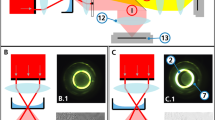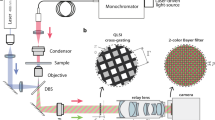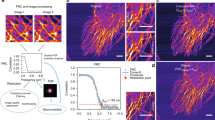Abstract
THE possibilities of utilizing the differential chromatic effects of the Rheinberg ring method of illumination, which was later developed into the optical staining principles of Kraft1, in conjunction with phase-contrast microscopy, suggested that, instead of having the substage stop quite blacked out except for the annulus, cross or line, whichever the case may be, this should be replaced by an appropriate colour filter, and the portion which usually transmits the light be of another colour in contrast to it.
This is a preview of subscription content, access via your institution
Access options
Subscribe to this journal
Receive 51 print issues and online access
$199.00 per year
only $3.90 per issue
Buy this article
- Purchase on Springer Link
- Instant access to full article PDF
Prices may be subject to local taxes which are calculated during checkout
Similar content being viewed by others
References
Kraft, P., Z. deut. geol. Gesell., 84, 651 (1932).
Semmens, C. S., and Bhaduri, P. N., Stain. Tech., 14, 1 (1939).
Author information
Authors and Affiliations
Rights and permissions
About this article
Cite this article
GRIGG, F. Colour-Contrast Phase Microscopy. Nature 165, 368–369 (1950). https://doi.org/10.1038/165368b0
Issue Date:
DOI: https://doi.org/10.1038/165368b0
Comments
By submitting a comment you agree to abide by our Terms and Community Guidelines. If you find something abusive or that does not comply with our terms or guidelines please flag it as inappropriate.



